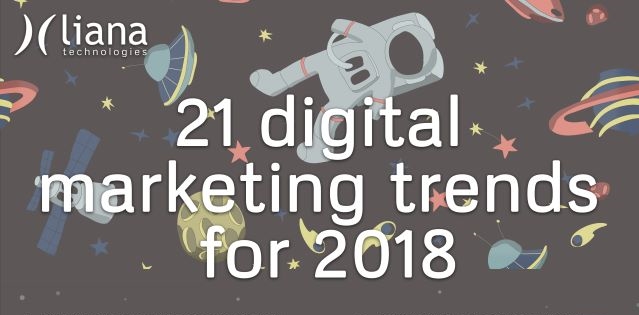
Digital marketing welcomes change. Every new technology is an opportunity to deepen the relationship between marketers and customers, and our technologically advanced world offers countless such opportunities. Are they going to shape 2018 in a new way and completely eclipse last year’s achievements? Rest assured, your expectations will not be betrayed.
So what are the future trends in digital marketing that 2018 is going to bring? That is the question Liana Technologies took upon themselves to explore, and their answer is presented in the form of the infographic below. It sums up 21 of the most important trends that you can bet on in the new year:
- Content tailored for your customers based on their browsing history and behavior.
- Tighter online security in order to ensure the safety of your customers’ privacy and their data.
- Even more video content to satisfy the users’ cravings.
- Exercising more caution when collaborating with influencers (such as measuring ROI and complying with legislation).
- Integration of artificial intelligence in more projects (like Pinterest has already done).
- Thorough analysis of Big Data as a means to improve customer service.
- The Internet of Things expanding, analyzing more of the customer input and providing more relevant information.
- Careful management of budgets by measuring return of investment.
- Making preparations for 5G mobile phones entering the market.
- Stay updated with the latest SEO factors influencing website rankings with WebCEO’s Website Audit Tool and evaluate your site’s current performance.
- Using Live Chat to provide customers with real-time answers.
- Using chatbots to handle the simplest customer requests.
- Identifying the moments right before customers make a purchase (known as micro-moments) and reacting in time to offer your product or service.
- Leveraging user-generated content to spread awareness of your brand.
- Leveraging short-lived content and platforms that support it.
- Adopting Artificial Reality and Virtual Reality technology.
- Social media taking a more active part in e-commerce by allowing transactional activities (a.k.a. social commerce).
- Adopting modern marketing strategies to target Generation Z.
- Providing a consistent online experience on all types of devices (cross-device marketing).
- Optimization of landing pages and conversion rates.
- Implementing the option to pay via a mobile device.



